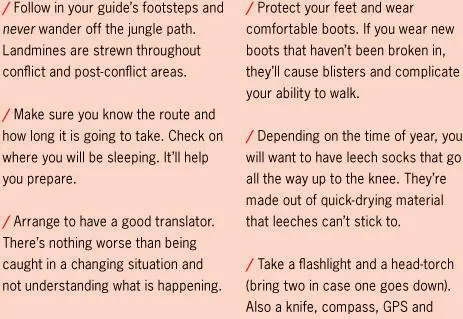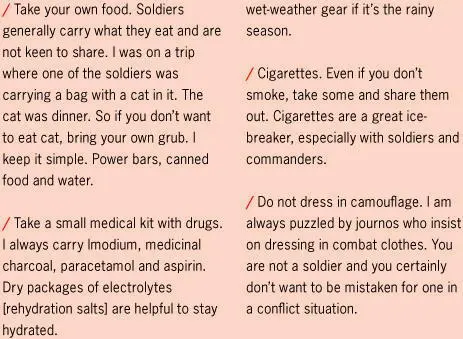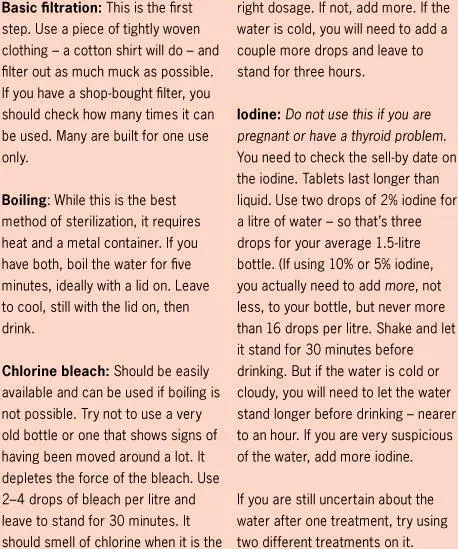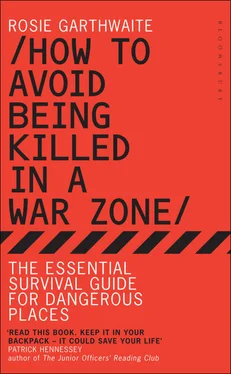‘You need to acquire your own set of survival skills and knowledge, and don’t assume that just because someone lives in a place that they necessarily know what you need to know about it.’
Jungle clothing
In the jungle you have to stay covered up, and I mean really covered up. Ideally, you will be wearing a hat, a scarf up around your ears and tucked into your long-sleeved shirt, which should be taped tight around your wrists. Your shirt should be tucked into your tough trousers, which are, in turn, tucked into your socks.
Night and day you need to remain on constant vigil. Exercise strict mosquito-net discipline by making sure there are no gaps and none of the net is touching you. Close the net behind you every time you leave. You have to choose the right style, shape and size of net to fit your particular needs. In the jungle you will likely need a wedge net to fit over a hammock or a cot bed. The net should be strong enough to withstand weeks of use without ripping, and be able to keep out the larger creatures that might want to crawl into your warm bed. Bring a needle and thread to carry out repairs.
A bum exposed during a pee can be mottled with sandflies in a minute (I know – I have experienced it). A brush against the wrong plant or caterpillar could cause a violent allergic reaction. There is a risk every moment that some venomous insect will bite you with hideous consequences – malaria to name just one of them.
Fortunately, most snakes can’t easily penetrate clothing. But you need to check for leeches on your legs and feet every hour – only for this are you allowed to be uncovered. If you find one, you need to remove it using salt, alcohol, or a lighter or a lit stick. Do not pull them off because there is a risk that the jaws or head could get stuck inside and cause an infection.
Travel together in a line in the jungle so that the person behind you can see if a spider drops from its web down the back of your shirt.
Avoiding creatures that bite
• Be careful about kicking rocks or picking up sticks and logs for a fire.
• Look where you are walking.
• Shake out your shoes and clothes before you put them on, even if you have taken them off for only a moment.
• Don’t plunge your hand into your bag without taking a look to see what crawled inside first.
MARC LABAN’S TERRIFIC JUNGLE TIPS


Treatment for bites
If bitten by a snake or scorpion, or any little vile beastie:
• Do not attempt to suck out the venom. Wash the wound and apply a compression bandage, but do not use a tourniquet.
• Immobilize the area bitten (see Immobilizing fractures) and keep the movement of your patient to a minimum.
• Do not try to kill the animal that bit your companion – just remember what it looked like in terms of markings and size.
• Don’t give morphine or aspirin for pain – use paracetamol.
• Get to a hospital quick smart. A bite is a medical emergency.
/DEALING WITH NATURAL DISASTERS
There’s danger, there’s war and then there are the five-star disasters – hurricanes, earthquakes, wildfires, floods and tsunamis. There is nothing that can prepare you for these.
After one of these catastrophic events, the world as we know it stops. Man has lost to nature, and now he must return to nature to survive.
In a man-made disaster such as war there is usually still access to water and food, and international laws remain in place. And if the supplies run out, you should be able to find a way out. But these events remove your ability to choose. Your options are reduced, and your focus is narrowed to finding a way to respond to your most basic needs.
The fight for limited resources of water, food, shelter, heat and light will lead to riots. Fathers will trample over others’ small children to get water for their own. A rumour can turn into a deadly stampede – either towards water or away from another feared disaster. If you have some water or food and it is only enough to keep you and the people around you going, do not tell anyone. Make yourself secure, safe and healthy; keep whatever you need to do your job. Then you can turn to helping others.
Your first thought after the immediate risk is gone should be communication with the people who know you are there – your colleagues, family and friends. Even if landlines and the Internet are down, the mobile networks will be working via the satellite link. Seek out an embassy or any connection to home. Establish a route for communication and use it.
When the norms of the world are turned on their head you can rely only on yourself. Be as self-sufficient as possible. Carry your tent, a sleeping bag, a medical kit, some cans of food, a torch, a means of communication, some chlorine or water purification tablets and some salt tablets (to be dissolved in water). This is especially true when there has been an earthquake – when all infrastructure is broken.
Sebastian Walker covered the Haiti earthquake in January 2010, and his principal piece of advice afterwards was not to sleep indoors…
‘In many places in the world, a 7.0 magnitude earthquake lasting just 27 seconds wouldn’t cause a huge amount of damage. In Haiti it levelled entire neighbourhoods, brought down the presidential palace and left more than 250,000 people dead. A major reason for this was cheap construction – building codes in developing countries are rarely stringent – but in Haiti, where the average wage is less than $2 a day, the average building is put together with the architectural equivalent of paper and glue, finished off with a ceiling of reinforced concrete.
‘Driving through the blacked-out city the following evening was like witnessing the apocalypse. Pancaked three-storey buildings looming out of the darkness, cars crushed by masonry with limbs poking out, every Haitian in Port-au-Prince sleeping on the street just yards from body after body of relatives pulled from rubble and piled up on the pavement. I could understand how they were afraid to venture back inside any structure still left standing, but having never been in an earthquake zone myself, I put most of it down to shock.
‘After an eerily quiet evening spent reporting on the dead, dying and dazed, our crew returned to base to file our story. We’d set up camp in the grounds of the Venezuelan embassy and it was starting to rain, so when all was done, I settled down for a nap underneath an arch.
‘It was the sound of a Haitian subway train passing beneath my feet that woke me. It seemed to travel on and then return even closer to the surface. Finally, when the earth started juddering and the stone above my head made a cracking noise, I sprang awake and sprinted into the middle of the courtyard.
‘The aftershock was 4.6 magnitude, but it didn’t bring down the arch I had been lying under. Over the next few weeks, however, there were dozens more, some of which did collapse already weakened buildings. It was only after weeks of living in a tent that I felt confident enough to spend a night in a hotel – and I stared at the ceiling for a good few hours before falling asleep.’
You can live for three weeks without food, but only three days without water. In extremis , you must make your own.
HOW TO PURIFY WATER

In extremes of hot and cold weather your body requires even more water than normal. Also, bleeding, injury or simple stress can all lead to dehydration. You need to find a drinkable water source as soon as possible.
Читать дальше







![Джонатан Димблби - Barbarossa - How Hitler Lost the War [calibre]](/books/385421/dzhonatan-dimblbi-barbarossa-how-hitler-lost-the-w-thumb.webp)







